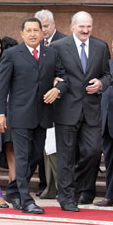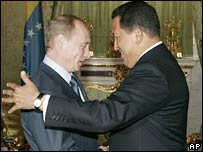The state of play...
Quico says: So, with 36 days to go until December 3rd, where is this election campaign? Basically, it's one of two things. Either:
- All the recent polls are roughly right, and Chavez is beating Rosales by somewhere between 15 and 30 points.
or
- People are too scared to tell pollsters the truth, and the race is actually neck and neck.
Which one is it? Frankly, the polling news is so incredibly awful, I can see how it beggars' opposition supporters' belief: if DATOS, Consultores 21 and Zogby are more or less right, it would mean that, through mid-October, Rosales had managed to consolidate the anti-Chavez base and that's it.
His numbers are below even the what a "generic anti-Chavez candidate" had in May and June polling. That would mean Rosales has not even managed to consolidate the support of all the non-Chavistas who said they were willing to vote against Chavez six months ago. Now, a bunch of them are "undecided"! Not good news for a candidate whose only path to victory, demographically speaking, is to sweep essentially all undecideds and win a few soft-core chavistas as well.
 DATOS tracking poll: OUCH!
DATOS tracking poll: OUCH!So can Rosales really be running so far behind? Or are the polls screwed up somehow? I tend to think we really are getting whooped. As Lucia - who, contrary to popular belief, is NOT me - posted in a recent comments section:
Every day, surveys are conducted in nations where voters face substantially more danger or political repression than they do in Venezuela. Whether it's the Gaza Strip or West Africa or Nepal -- polling is happening. Pollsters who work in such places have developed methods for determining whether/how fear affects their ability to take an accurate survey, and for making the necessary adjustments.
But ask Luis Vicente Leon, Luis Christiansen, Saade, Keller et al if they're finding it harder than usual to get people to agree to participate? Once they agree, are more interviews (than usual) terminated once people realize political questions are included?
They'd tell you: nope, nothing out of the ordinary on that front.
Nor would any other of the normal indicators be present -- or, again, not present in sufficient size to warrant throwing traditional methods (and their results) out of the window.
But even if the slew of recent polls
are all way off because people are fibbing to pollsters, I don't really see how that's good news for the opposition. If folks really are so scared of getting on the wrong side of the Bolivarianos that they won't even talk honestly to a pollster, what are the chances they'll feel emboldened enough to put their finger on a fingerprint scanner, get their names ticked off on a
cuaderno electronico, and then go cast a vote for Rosales on a Smartmatic machine? That, my friends, is a much, much scarier proposition.
We should be honest here: unless something dramatic happens in the next month and a half to change the dynamics of the race, we're going to lose, and we're going to lose by a lot.
Admittedly, it always seemed likely that we would lose simply because most people vote with their pocketbooks and we're in the middle of an extravagant oil bonanza. But losing by 5 points is not the same thing as losing by 25 points...and what's staggering is that we seem headed for 25-point country.
A more eloquent candidate, one less visibly tied to the traditional opposition political class, a more effectively communicated
Mi Negra...we can all start making our little pet lists of what the opposition might have done differently. But then, even the perfect oppo candidate running the perfect oppo campaign would find it hard to beat Comandante Moneybags and the $60/Barrel Brigade.
Surely I'll eat my words with a spoon if something dramatic happens in the next five weeks to change the dynamics of the race. But at the moment? It's grim...
Please comment responsibly:
|
A surplus of half-truths
 Katy says:
Katy says: Venezuela's Finance Minister
unveiled the government's budget for fiscal year 2007 recently. Venezuelan consultancy
Veneconomy recently published an op-ed piece, for subscribers only, that sheds some light on what the document contains.
One of the main features of the budget is that both income and expenses are under-estimated, as is usual in Venezuelan budgets. But Veneconomy argues that the Chávez administration is grossly under-estimating earnings for next year with the sole purpose of lowering their obligations to state and local governments through Constitutional Allocations.
In Venezuela, state and local governments have very few tools to tax the population. Instead, they are automatically entitled to a percentage of the government's "ordinary income" as defined in each year's budget. This proportion is distributed among the different governments according to their population.
The 2007 budget assumes the price of oil will be $29. It also assumes inflation will be around 10-12%, contrary to Veneconomy's estimates of 17-19%. Finally, the budget assumes the exchange rate will remain at 2,150 Bs/$. Veneconomy thinks it is unlikely the exchange rate will remain in that range, predicting that it will have to change to 2,400 Bs/$ before 2007 is out.
The outcome of all this is that income and expenses are under-estimated. For example, any oil income stemming from a price of oil higher than US$29 would be considered "extraordinary income" and would therefore not be part of Constitutional Allocations. Any extra income from a depreciation of the exchange rate is also considered "extraordinary income" and would not be part of the allocations to state and local governments either.
Expenses are also under-estimated. The budget assumes, according to Veneconomy, that both income and expenses will remain constant relative to this year's budget. This implies that, in real terms (i.e., after taking into account an inflation of more than 15%), budgeted real spending and budgeted real income would be lower next year than this year. Likewise, if inflation leaps above 10-12%, state and local governments would not be entitled to compensation to cover the higher costs of the public goods they wish to provide.
The true story behind this, according to Veneconomy, is that both income and expenses are under-estimated in the budget because every year, a higher portion of both is going to special accounts in
PDVSA and
Fonden, which are handled outside normal budgetary rules. This allows spending to be more discretional and for there to be much less oversight.
Although the National Assembly has become a mere formality due to the total absence of forces contrary to the government, the formality of budget discussions still left room for independent economists and the press to exercise a bit of oversight. This task becomes practically impossible when up to 25% of government spending and income, according to Veneconomy, are not included in the budget but rather in obscure accounts that the Executive manipulates at will and with little to no scrutiny.
Budgets are important because they reflect a government's priorities. Without a formal budgetary discussion, politicians cannot be held accountable by the citizens whose money they are spending. The more obscure the budget becomes, the more discretionary its allocations, the less oversight we will have. In the end, it's democracy that suffers.
Please comment responsibly:
|
Atrévete te te te...
 JayDee says:
JayDee says: Manuel Rosales made a formal presentation of his Government Program yesterday in the Caracas Eurobuilding. There was no Q&A session for journalists, and he left right after the speech.
Here are some of the highlights:
“Mine will be a completely new government, run by talented professionals.”
“On December 4th, we will have a new opposition, one that will play a role in the decision making process of whichever government.”
“On December 4th, we will have a new Assembly National, and it will respect the necessity of minority representation in the government.”
“I don’t want to be a government that controls all the power; I want my government to have limits on its authority.”
“We should have elections every four years, with a single re-election. 8 years is more than enough for a President to carry out his vision.”
“We will respect private property, from the smallest homes, to the largest businesses.”
“We will respect the professionalism of the armed forces.”
“Our first act will be to de-centralize the authority of the President, so that the Governors and Mayors of Venezuela have more of a say.”
“We will have a foreign policy that encourages regional integration while it defends the interests of Venezuelans.”
“I will be the first Venezuelan President to really preoccupy himself with the well being of our environment.”
“We will construct 1.5 million homes in my administration.”
“We are going to eliminate all politics from our schools.”
“I am going to subsidize the agricultural sector, so that our farmers stop giving away what they grow to other countries.”
“I don’t have any owner; I am free of any previous attachments. I will govern myself, as my own boss.”
Please comment responsibly:
|
Why corruption isn't working as an issue for Rosales...
Quico says: One baffling, infuriating puzzle about this election is why Manuel Rosales isn't getting more traction on corruption. According to Keller's 3rd quarter survey, 52% of respondents think corruption is getting worse, and 30% think it's as bad as it's always been. Only on crime and drugs are people more critical of the government. So why can't Rosales get a lift out of it?

I think the answer is that corruption only riles people up when the economy stinks. During bad times, Venezuelans make a direct link between their pocket-book and corruption. They figure if they don't have any money, it's because people in power are stealing it. This is why Chavez managed to get so much traction out of the issue back in 1998...when oil was selling for 10 bucks a pop.
But now? The country is awash in petrodollars, people have more money in their pocket than they used to, times are good. In that setting, corruption becomes an abstract issue. Surely they know that the chavista elite is stealing a bucketfull - that's what they tell Keller. But that realization doesn't sear with the intensity of rage it would engender if people perceived that they can't afford lunch because somebody in power stole their money.
It's one of the screwy features of petrodependency. Corruption, as an issue, only "works" in Venezuela when the oil market tanks.
Please comment responsibly:
|
Mi Negra: It’s not about growth!
You know, the dangest people seem to read Caracas Chronicles. Today, we have a guest post on Mi Negra by Omar Zambrano, a Venezuelan economist working in Washington, DC Omar says: Mi Negra
Omar says: Mi Negra, Manuel Rosales' flagship social policy proposal, has generated an intense electoral debate. Unfortunately, discussion on its potential economic and development impacts has been rather scarce and shallow. With some crucial features of the scheme still unclear or unrevealed, particularly those related to the ultimate beneficiaries and the conditions attached to the handouts (as well as some still fuzzy financial sustainability issues), I'd say we can reasonably characterize the Rosales' proposal as a Venezuelan variant of a Conditional Cash Transfer (CCT) mechanism, which is a handout to a targeted set of households (e.g. the poor, the poorest of the poor, the unemployed) contingent on a given behavior (e.g. children's education and health, home improvement, etc.).
The question of who will benefit is an important one: the economic impacts of more targeted mechanism like a CCT, can differ radically from proposals
like the one presented earlier by Julio Borges. Just for background, this sort of anti-poverty program has been used with
considerable success in the region since the early 90's. The idea has been replicated elsewhere in the developing world. As trivia, I was surprised to find out that a program whose earliest precedent can be traced in Venezuela (the
Beca Escolar, 1989), now is being considered
even in the most conspicuous city of Mr. Danger's empire.First off, lets be clear: I really don't think we should judge
Mi Negra in terms of its effects on growth. Don't get me wrong. I'm sure that
Mi Negra would have huge growth implications, and I'm pretty certain those effects would be positive. But growth considerations should not take center stage in discussing an instrument designed to achieve something else: to fight poverty and exclusion.
As I told Quico privately, we economists are trained to think you need as many public policy instruments as you have public policy goals. In a world with multiple objectives, you will need multiple instruments. Policy makers should aim to maximize social welfare, not growth rates. If we agree that
Mi Negra is the best instrument for poverty alleviation, we still have many other instruments to tackle growth objectives like the trade policy, exchange rate policy or oil producing policy, etc.
Having said that, I still think
Mi Negra would have a positive impact on growth.
Inequality and growth The record so far shows conditional cash transfer mechanisms (CCTs) are very effective tools in alleviating poverty and improving equity. And measures that help lessen inequality help to spur growth. Here the evidence is quite robust: in a world of highly imperfect markets, those who do not have enough wealth or social status tend to under-invests or to invest in relatively unproductive activities.
Think of a buhonero using
Mi Negra cash to finance the transition from being an informal employee (of the buhonero mafia) to a micro entrepreneur (a buhonero who sell his own stuff). An equity improving mechanism like
Mi Negra would be efficiency enhancing in the sense of helping to reallocate resources from low-productivity activities to high productivity activities (see World Development Report 2006, Ch.5).
This idea may also hold at the aggregate level. Some authors find
evidence that decreased inequality may be related to improved growth rates in poor countries. The argument, in brief, is that
Mi Negra could help to raise investment rates, and better investment rates can lead to better growth rates.
Human Capital Accumulation Provided handouts are attached to some conditions, CCTs have been highly effective increasing the, acquisition, accumulation and access to human capital (which is more education and better health) for the children of beneficiaries. Rigorous studies of Mexico's Progresa/Oportunidades program, Brazil's Bolsa familia and Colombia's Familias en Accion, among others, show clear improvements in the educational achievement and health levels among those targeted by the programs. The effect of human capital accumulation on growth is a well studied and verified phenomenon, now in the mainstream of growth theories. In the 1980s, this theoretical advance was called the endogenous growth revolution - but I can assure you, it's exactly nothing at all like the
Nucleos de Desarrollo Endogeno.
Empowerment, transparency and accountability For certain, the effects in this area are the more important ones. I will paraphrase here my friend Rei, another loyal
Caracas Chronicles reader:
Mi Negra is the first public policy idea we've seen that openly challenge the distributive model that has been in place in Venezuela since the discover of the Barroso II dwell in 1914. The proposal is absolutely liberal: it gives control over oil rents over to the individual, not the state apparatus.
So the proposal will enhance the incentives for the public to closely monitoring the actions of the State and the oil industry, and generate demand for transparency and accountability in the oil industry, strengthening the checks and balances over the system. Empowerment is the name of the game. As long as
Mi Negra leads to a more efficient, transparent and accountable state, we can expect gains in the growth perspective of the country. The evidence here is
quite robust as well.So, can
Mi Negra serve as the desperately needed growth engine for the Venezuelan economy? Probably but, perhaps not. If it doesn't, does that make it a bad proposal? Not at all.
Please comment responsibly:
|
Putin heads for the door, Leopoldo stirs the pot
 Katy says:
Katy says: Two quick notes:
1.Russian President and elected autocrat Vladimir Putin announced today that, contrary to expectations, he will
not attempt to modify his country's Constitution, which imposes a term limit on the Presidency. So he will be leaving office in 2008, even though he is very popular.
Putin's term has been marked by sky-high oil prices, a booming economy,
growing presidential control of all of Russia's institutions, a controversial war in Chechnya,
hostile attitudes toward weaker neighbors and
increasingly heavy-handed restrictions on democratic freedoms.
Despite all of this, Putin has decided to show some democratic colors and is stepping down. Let's hope that our own petrocrat follows Putin's lead - that is,
if voters decide to give him another term.
(Note: Russia is a big, complicated country; pardon the simplification.)
2.Leopoldo- Alek Boyd has an
interesting interview with Chacao Mayor Leopoldo López, undoubtedly one of the opposition's brightest political stars. I take issue with some of López's positions regarding the Recall Referendum, but the interview is good in that it highlights the fact that the defense of the vote requires such a huge volunteer force, it becomes a task for all of us, not just the politicians. It is up to us to defend our votes.
The problem is that the Rosales campaign is not doing a good enough job of convincing people that voting itself will be secret. There is still a lot of fear in the general population about this point, and it should be addressed from now until the end of the campaign.
That is, of course, assuming it will be secret, which it will be... right?
Please comment responsibly:
|
Being obnoxious as raison d'état
So, it turns out that silly oppo commentators like me had it all wrong: the reason Chavez spent the last few months visiting some 30 capitals and handing out over a billion dollars sweetening up developing country governments was not to get a UN Security Council seat at all. Heavens no! The point, it turns out, was to demonstrate we could block a US-backed bid if we wanted to,
to teach the empire a lesson. An objective, you'll agree, that "we have fulfilled."
Sigh.
So is this a sign that Chávez is ready to declare victory and move on from this embarrassing episode? Not at all. His acknowledgement that Venezuela will not get a rotating UN Security Council seat was followed not by acceptance of the need for a consensus candidate, but by a vow not to give up.
Pardon me if I fail to see any logic in this one. Once you've fessed up that you're not going to get the UNSC seat, what possible point is there in "not giving up"? To make sure they've learned their lesson extra good? Or to annoy the shit out of 192 UN ambassadors?
It's almost churchillian, the sentiment...
We shall annoy them on the seas and oceans, we shall annoy them with growing confidence and growing strength in the air, we shall annoy them on the beaches, we shall annoy them on the landing grounds, we shall annoy them in the fields and in the streets, we shall annoy them in the hills; we shall never surrender.
Please comment responsibly:
|







 Chavez Reelection Blog: Katy documents the government's use of public resources for Chavez's partisan advantage.
Chavez Reelection Blog: Katy documents the government's use of public resources for Chavez's partisan advantage.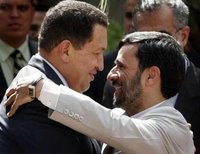

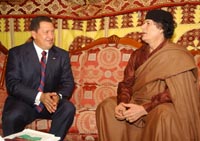

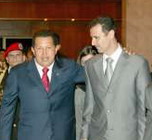
 Site feed
Site feed 